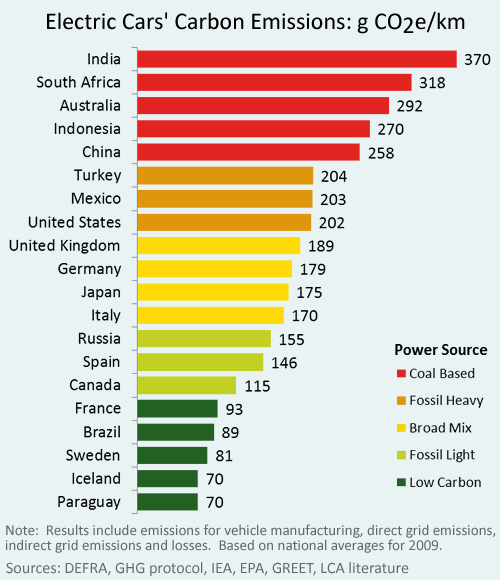Email of the day on electric cars and overall pollution
With regard to electric cars decreasing the world's need for fossil fuels, how is the electricity going to be generated? I have heard the Netherlands, who are one of the world leaders in using electric cars, have had to build three new generating plants already to meet the demand and these are coal fired. It is true that electric cars will laudably reduce urban pollution, where 85% of CO2 generation is created. But CO2 production will simply be transferred to rural areas, where electricity generating plants are normally situated. Energy consumption not be reduced and, since the energy production will be a two-step procedure instead of a single stage, it may well be increased.
Thank you for this email which raises important questions and highlights that the energy sector is not suitable for a one size fits all solution. I agree that an electric vehicle is, on aggregate, only as clean as the fuel used to generate its power. This graphic from shrinkthatfootprint.com is a useful barometer for how successful countries are in that regard.

Europe is burning more coal than ever because of the intermittency of wind and solar. In fact the situation is even more acute at present because of unplanned shutdowns in French nuclear plants. More nuclear energy would be a simple solution but has obvious disadvantages and is politically unpopular in Europe.
There are emerging technologies that will improve the efficiency of the grid but they might be considered next generation rather than imminent. The most promising are utility scale batteries. Ambri has an aluminium ion solution that sacrifices low mass for more energy density and is aiming at the utility sector. It is a development stage company, led by Donald Sadoway at MIT and received seed investment from the Gates Foundation. It reports seeking an additional round of funding as early as next year and may be one to watch for an eventual commercial product.
One of the reasons renewables are inefficient is because utilities have to maintain so much spare capacity to meet base load at peak consuming times. Introducing more batteries via the production and consumption stages has the potential to smoothen out the production profile of energy and therefore open up the potential to remove polluting plants. That is the true promise of electric vehicles. The development of the battery technology to power them could also be the solution to solving our pollution issues. The evolution of battery technology is slower than we have been used to with microprocessors but it is happening and battery density is doubling about every 5.3 years or on 14% compound growth rate.
Back to top


